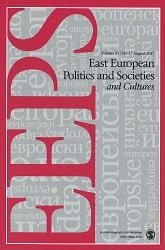Border Trouble: Ethnopolitics and Cosmopolitan Memory in Recent Polish Cinema
Border Trouble: Ethnopolitics and Cosmopolitan Memory in Recent Polish Cinema
Author(s): Simon LewisSubject(s): Cultural history, Political history, Social development, Rural and urban sociology, WW II and following years (1940 - 1949), Film / Cinema / Cinematography, Politics of History/Memory, Politics and Identity
Published by: SAGE Publications Ltd
Keywords: cosmopolitanism; borderlands; memory; Agnieszka Holland; Wojciech Smarzowski;
Summary/Abstract: The border shifts and population exchanges between Central and East European states agreed at the 1945 Potsdam Conference continue to reverberate in the culture and politics of those countries. Focusing on Poland, this article proposes the term “border trouble” to interpret the politicized split in memory that has run through Polish culture since the end of the Second World War. Border trouble is a form of cultural trauma that transcends binaries of perpetrator/victim and oppressor/oppressed; it is also a tool for analyzing the ways in which spatial imagination, memory, and identity interact in visual and literary narratives. A close analysis of four recent feature films demonstrates the emergence of a visual grammar of cosmopolitan memory and identity in relation to borderland spaces. Wojciech Smarzowski’s Róża (“Rose,” 2011) and Agnieszka Holland’s Pokot (“Spoor,” 2017) are both set in territories that were transferred from Germany to Poland in 1945. Wołyń (“Volhynia,” released internationally as “Hatred,” 2016) and W ciemności (“In Darkness,” 2011), also directed by Smarzowski and Holland respectively, are set in regions that were under Polish administration before the war but were transferred to Soviet Ukraine in 1945. All four productions break new ground in the memorialization of the post-war legacy in Poland. They deconstruct hitherto dominant discourses of simultaneity and ethnic homogeneity, engaging in Poland’s wars of symbols as a third voice: anti-nationalist, but also refusing to essentialize cosmopolitan identity. They show the evolution of border trouble in response to contemporary political and cultural developments.
Journal: East European Politics and Societies
- Issue Year: 33/2019
- Issue No: 02
- Page Range: 522-549
- Page Count: 28
- Language: English
- Content File-PDF

